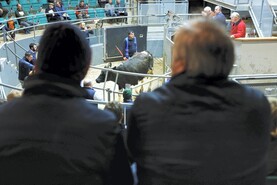While the Brexit deal avoided tariffs and quotas on Irish dairy and beef, it is still “problematic” for milk produced in Northern Ireland, according to Minister for Foreign Affairs Simon Coveney.
Speaking at the online north Tipperary IFA AGM on Tuesday, he said that while farmers in Northern Ireland were still required to produce food to the same standards as their neighbours across the border, it could not be sold as a product of Irish or EU origin post-Brexit.
“For a number of dairy companies in particular, this is problematic,” Minister Coveney said, referencing Lakeland and Glanbia who draw some of their milk pool from Northern Ireland.
He said it was something that he was keen to work on, but pointed out that it would take time and there were roughly 60 trade agreements within the current deal that would have to be gone through one by one.
Minister Coveney also sounded a note of caution about the possibility of the British government pursuing cheap food deals with other countries that would supplant Irish products, but said he did not expect this to happen in the short term.
Seamless trade
Ultimately, he said the days of “seamless trade” between the UK and Ireland were over but that, importantly, the EU had managed to create a deal that avoided tariffs and quotas on Irish beef and dairy into the UK market.
In particular, he pointed out that the deal had avoided tariffs of €750m/year on Irish beef to the UK.
He freely admitted, however, that there were challenges ahead in terms of bureaucracy and increased paperwork in getting goods across the Irish Sea and that he expected further disruption to trade and haulage.
He said the €1.05bn Ireland was to receive in the Brexit Adjustment Reserve would go towards supporting these additional bureaucratic costs.
Read more
Irish food and drink exports hit €13bn
Farmers set to receive share of billion euro Brexit fund
While the Brexit deal avoided tariffs and quotas on Irish dairy and beef, it is still “problematic” for milk produced in Northern Ireland, according to Minister for Foreign Affairs Simon Coveney.
Speaking at the online north Tipperary IFA AGM on Tuesday, he said that while farmers in Northern Ireland were still required to produce food to the same standards as their neighbours across the border, it could not be sold as a product of Irish or EU origin post-Brexit.
“For a number of dairy companies in particular, this is problematic,” Minister Coveney said, referencing Lakeland and Glanbia who draw some of their milk pool from Northern Ireland.
He said it was something that he was keen to work on, but pointed out that it would take time and there were roughly 60 trade agreements within the current deal that would have to be gone through one by one.
Minister Coveney also sounded a note of caution about the possibility of the British government pursuing cheap food deals with other countries that would supplant Irish products, but said he did not expect this to happen in the short term.
Seamless trade
Ultimately, he said the days of “seamless trade” between the UK and Ireland were over but that, importantly, the EU had managed to create a deal that avoided tariffs and quotas on Irish beef and dairy into the UK market.
In particular, he pointed out that the deal had avoided tariffs of €750m/year on Irish beef to the UK.
He freely admitted, however, that there were challenges ahead in terms of bureaucracy and increased paperwork in getting goods across the Irish Sea and that he expected further disruption to trade and haulage.
He said the €1.05bn Ireland was to receive in the Brexit Adjustment Reserve would go towards supporting these additional bureaucratic costs.
Read more
Irish food and drink exports hit €13bn
Farmers set to receive share of billion euro Brexit fund






 This is a subscriber-only article
This is a subscriber-only article










SHARING OPTIONS: